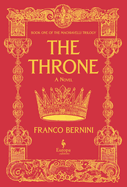
A man whose name would one day become an eponym for manipulation engages in a fraught but potentially symbiotic quest for fame with Cesare Borgia, a duke and the son of Pope Alexander VI, in The Throne, the first volume in Franco Bernini's Machiavelli trilogy.
In 1502, Niccolò Machiavelli is still a long way from being an iconic writer. He's deeply in debt and his dreams of fame as a poet seem doomed. But "occupying one of the lowest ranks in the administrative hierarchy, Niccolò is used to looking up." A sharp observer of the powerful, he has been ordered to spy on Borgia for the Florentine Republic (which Borgia has twice attempted to invade) under the pretense of serving as an envoy with the authority to negotiate an alliance but not to finalize it. However, complications arise when Borgia commissions Machiavelli to write a book to cement his legacy. Machiavelli becomes entranced first by the beauty of Borgia's captive, Dianora Mambelli, and then by her tragic story, which only leaves him further entangled.
Screenwriter and novelist Bernini's English-language debut, translated from the Italian by Oonagh Stransky, is a transporting portrayal of Renaissance-era political life. His cinematic touch is present in the historical detail of the setting and the dramatic tension between Borgia and Machiavelli. Borgia needs Machiavelli to preserve his life's story for the ages but also seeks to bind him with the offer of literary immortality. Although the novel's six epilogues are more than most readers would expect, particularly for the first book in a series, those readers will remain eager to follow Bernini through the rest of Machiavelli's life. --Kristen Allen-Vogel, information services librarian at Dayton Metro Library

